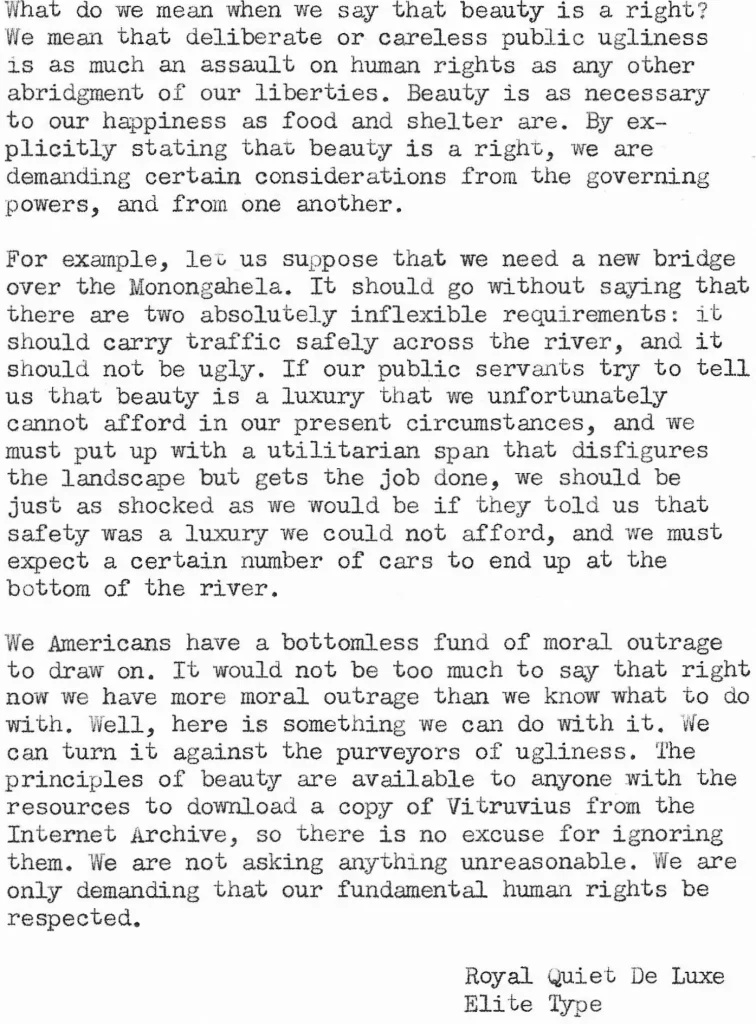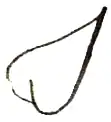

Transcribed below. For those who read French, here is the editorial we mentioned: « La beauté est un droit ».
Beauty Is a Right
Those striking words come from an editorial in a television magazine published in 1974. You may be reading over that first sentence again right now, trying to figure out whether you read it correctly the first time. That’s all right. We’ll wait right here.
Yes, it was a television magazine, the kind you used to consult to find out what was on tonight if you cared to watch the television. But of course it was in French, and we suppose that makes all the difference. An American who said such a thing would be carted off to an institution for the criminally batso, but it makes perfect sense for a French writer to insist that beauty is a right, even in so prosaic a forum as the French equivalent of TV Guide.
The editorial complains about the same things many Americans have complained about over the past few decades. Expressways destroy ancient landmarks. Ugly blocks of flats (rabbit-cages, as our editor calls them) are thrown up on the outskirts of a pleasant village–the one where our editor lives. Americans find these things just as deplorable as French editors do. But we Americans accept them with what one is almost tempted to call a Gallic shrug. What can you do? Progress. Business.
Well, the French editor was going to do something. He was going to write an editorial. He was going to throw down the gauntlet and declare that beauty is a basic human right. An editorial in a television magazine may not be the most effective form of political action, but it is something rather than nothing.
A French writer can get away with saying that beauty is a right. But could an American? It would cause consternation among the puritans, who suspect beauty in any form of being a snare of the devil. But it is good to consternate the puritans once in a while. It exercises their immune systems and builds up a healthy resistance to infectious ideas. And it is possible, though by no means certain, that the First Amendment will protect us from legal consequences. So let us go ahead and say it: Beauty is a right.
What do we mean when we say that beauty is a right? We mean that deliberate or careless public ugliness is as much an assault on human rights as any other abridgment of our liberties. Beauty is as necessary to our happiness as food and shelter are. By explicitly stating that beauty is a right, we are demanding certain considerations from the governing powers, and from one another.
For example, let us suppose that we need a new bridge over the Monongahela. It should go without saying that there are two absolutely inflexible requirements: it should carry traffic safely across the river, and it should not be ugly. If our public servants try to tell us that beauty is a luxury that we unfortunately cannot afford in our present circumstances, and we must put up with a utilitarian span that disfigures the landscape but gets the job done, we should be just as shocked as we would be if they told us that safety was a luxury we could not afford, and we must expect a certain number of cars to end up at the bottom of the river.
We Americans have a bottomless fund of moral outrage to draw on. It would not be too much to say that right now we have more moral outrage than we know what to do with. Well, here is something we can do with it. We can turn it against the purveyors of ugliness. The principles of beauty are available to anyone with the resources to download a copy of Vitruvius from the Internet Archive, so there is no excuse for ignoring them. We are not asking anything unreasonable. We are only demanding that our fundamental human rights be respected.
Royal Quiet De Luxe
Elite Type

Leave a Reply